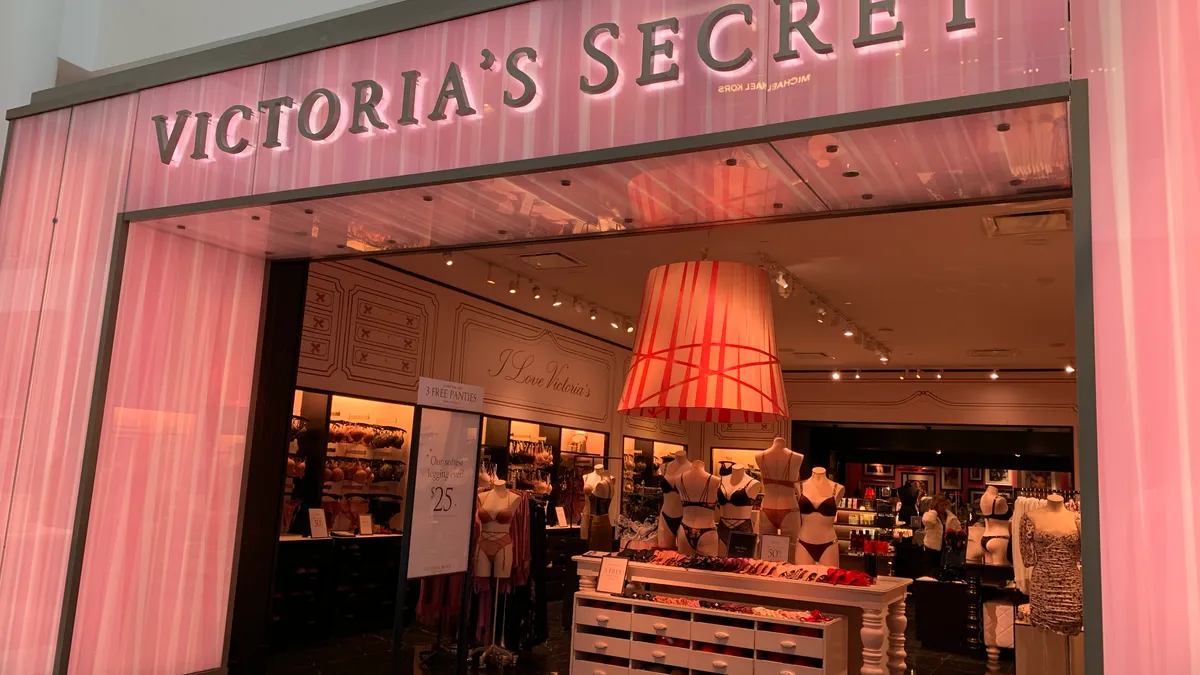Dive Brief:
-
L Brands on Tuesday said that, after entertaining interest from several potential buyers, its board instead unanimously approved a tax-free spinoff of its Victoria's Secret business into a public company apart from its Bath & Body Works banner. The separation is expected to be completed in August, according to a company press release.
-
L Brands CEO Andrew Meslow will retain that position and lead Bath & Body Works following the spinoff. Victoria's Secret CEO Martin Waters will continue to lead the stand-alone Victoria's Secret business, which includes the namesake brand and Pink.
-
The conglomerate released preliminary first quarter results, reporting an overall 83% net sales rise to $3 billion, reflecting a 93% increase to $1.5 billion at Bath & Body Works and a 74% increase to $1.6 billion at Victoria's Secret. Comps rose 21%; 16% at Bath & Body Works and 25% at Victoria's Secret. L Brands operating income reached about $570 million — $380 million at Bath & Body Works and $245 million at Victoria's Secret.
Dive Insight:
L Brands was willing to settle for a lot less a year ago when it inked a deal with Sycamore Partners for the private equity firm to take a majority interest in Victoria's Secret for about $525 million.
The ink proved to be less than indelible as the pandemic hit. Sycamore backed out, and, after some skirmishing in court, the two companies walked away without penalty. However, L Brands executives held onto their goal of separating the businesses somehow, and for months have said that the work that went into crafting that Sycamore deal was useful as they explored their options.
With a separation apparently set in stone, speculation shifted to how much the company could get for its beleaguered lingerie brand, which for years failed to respond to consumers' rejection of its sexualized marketing and designs as new rivals took share.
In recent weeks, L Brands rejected bids of more than $3 billion because it expects Victoria's Secret to be valued at as much as $7 billion and at least $5 billion, the New York Times Dealbook team reported Tuesday. At the end of March, MKM Partners pegged a valuation between $4 billion and $6 billion.
"[T]he Board believes that this path forward will return the highest value to shareholders and that the separation will allow each business to achieve its best opportunities for growth," Board Chair Sarah Nash said in a statement, noting that the brand has become more profitable via merchandise upgrades and cost cuts.
Improvements were visible at Victoria's Secret as early as the third quarter last year, despite ongoing challenges from the pandemic. Those are still being felt, as seen in the comps disparity at physical stores. Bath & Body Works comps rose 12% in the first quarter, after a 20% jump a year ago, while Victoria's Secret comps rose 3%, after an 18% drop last year. The lingerie brand is shutting stores in North America, especially at malls, announcing 250 closures last year and another 50 earlier this year.
However, while the company's rejection of suitors demonstrates its renewed confidence in Victoria's Secret, it also reflects ongoing investor uncertainty about apparel broadly, and the relatively minimal advances at the brand specifically, according to GlobalData Managing Director Neil Saunders. Last year, sales at the lingerie business fell 29.7%, "somewhat worse than that of the overall apparel market, and considerably worse than rivals like Aerie," he said in emailed comments. "This is not to say that no progress has been made at Victoria's Secret; however, the impact on the business has been negligible."
And while Victoria's Secret's growth may look strong in 2021 compared to last year, sales compared to pre-pandemic 2019 will likely be down, Saunders also said. "[T]he divorce gives Victoria's Secret no place to hide," he said. "Its numbers will no longer be flattered by the contribution of Bath & Body Works and its management team will be fully accountable to investors. Such accountability is no bad thing and will likely sharpen efforts to enact a genuine turnaround at the company."
Still, the spinoff is ultimately a good call, according to Saunders and MKM Partners Managing Director Roxanne Meyer. Shares fell Tuesday on the news, mainly because a sale would have been an option with more certainty, Meyer said in emailed comments. In fact a sale is still possible, although the price tag may be too dear for private equity or a SPAC, she also said.
"[C]reating two separate public companies does make sense and given the current bull market, will likely create value over time," Saunders said. "This is especially so for Bath & Body Works which, despite being the more successful of the two brands, is often overlooked and overshadowed by its less impressive sibling."
Sometime in August, once Victoria's Secret is gone, L Brands will no longer be a clothing retailer, a remarkable development given founder Les Wexner's revolutionary apparel merchandising through more than half a century. Wexner, who had previously relinquished his role as chief executive, also gave up his spot on the board earlier this year.
















